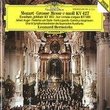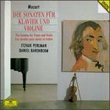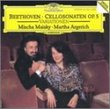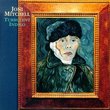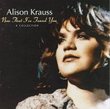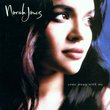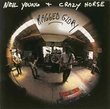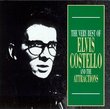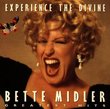| All Artists: Franz Schubert, Emerson String Quartet Title: Schubert: String Quintet in C, D. 956 Members Wishing: 0 Total Copies: 0 Label: Deutsche Grammophon Release Date: 8/11/1992 Genre: Classical Style: Chamber Music Number of Discs: 1 SwapaCD Credits: 1 UPC: 028943179225 |
Search - Franz Schubert, Emerson String Quartet :: Schubert: String Quintet in C, D. 956
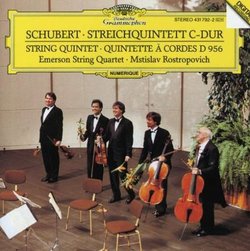 | Franz Schubert, Emerson String Quartet Schubert: String Quintet in C, D. 956 Genre: Classical
When not composing songs, Franz Schubert was most at home with chamber music, not because he was a miniaturist, but because his most profound thoughts were most readily contained by smaller, more concentrated ensembles. Hi... more » |
Larger Image |
CD DetailsSynopsis
Amazon.com essential recording When not composing songs, Franz Schubert was most at home with chamber music, not because he was a miniaturist, but because his most profound thoughts were most readily contained by smaller, more concentrated ensembles. His Quintet in C--by far the great work ever written for a string quartet with an extra cello--shows him at his summit with an ethereal second movement that often communicates the sense of spiritual suspended animation that the minimalists strive for but don't often achieve. The Emerson Quartet might seem a bit edgy for this assignment, but instead, the quartet delivers one of the best recordings of its career. Instead of just being swept away by its rapturous lyricism, the quartet probes the emotional depths and meaning of the music's gestures in concentrated, deeply felt performances. The piece is clearly a particular favorite of guest cellist Mstislav Rostropovich (he has recorded it several times before), but like most good chamber players, his presence isn't heard so much as it's felt. Perhaps he is responsible for the particular warmth of this performance. --David Patrick Stearns Similar CDs
Similarly Requested CDs
|
CD ReviewsSublime Schubert eido | 06/02/2000 (5 out of 5 stars) "Schubert's music often seems to work in the opposite manner as that of Beethoven: rather than being highly energized and goal-oriented, Schubert shuns endings, favoring extended and somewhat bittersweet lyricism. The C major quintet is a perfect example of Schubert's compositional style-- the first movement alone is nearly 20 minutes, and the entire quartet is just 7 minutes shy of an hour. The Quintet is not only one Schubert's finest works, but one of the finest pieces of chamber music ever written. This recording is simply beautiful (even though, alas, it is not a period performance). Schubert's music demands time and space in which to breathe, and the Emerson quartet gives both. The tempos are never rushed-- the second movement is heart breakingly slow and tender-- and the phrasing is exquisite. This is music in which one can and should wallow." Should be on everyone's Desert Island Disc list chefdevergue | Spokane, WA United States | 12/17/2003 (5 out of 5 stars) "I would not have thought that this would be my preferred recording of the Schubert Quintet. When this was released, I was acquainted with the Emerson Quartet through their recordings of the Bartok quartets and also their recordings of the Ives & Barber quartets. That resume did not give me any assurance as to their competence as Schubert interpreters. Also, Rostropovich has never particularly been a favorite cellist of mine. I came to this recording with only moderate expectations.I was pleasantly suprised. The Emerson Quartet has proven to be more than equal to the task and has crafted a sublime performance. This is one of the best Schubert recordings I have ever heard, and deserves to be on everyone's Desert Island Disc list. It certainly is on mine." A Rare Coupling and a Sublime Experience Free Thinker | Philadelphia, PA USA | 02/28/2002 (5 out of 5 stars) "This disc must rank amongst the finest recordings of chamber music in the catalogue. Schubert's incredible masterwork (surprisingly unknown by non-music lovers), played to brilliant effect, with excellent quality sound. As has been stated by other reviewers, and has been known by music lovers since this music was composed, this music is worthy of being called "sublime." All four movements are superior, and as a whole, they form an enlightening musical experience. Rostropovich, a true cello legend (some say, one of the two or three greatest ever recorded), has partnered here with the Emersons to great success. A true joy of music making can be felt among these 5 musicians, to the delight of the listener. Whether its the serene beauty of the 2nd movement, or the rhythmic drive of the 3rd movement, there are countless moments to treasure here. DG captures the sound of the efforts here in rich, full bodied, all-digital fashion. It should be stated that the disc has no couplings, and is rather short for its price -- but the quality here is of the highest caliber.This work is amply represented by the catalogue, and though there are many excellent ones (Alban Berg Quartet, etc.), this recording is my personal favorite. Rostropovich's golden sound accompanies the Emerson's in alluring fashion. This is one of my desert island selections."
|

 Track Listings (4) - Disc #1
Track Listings (4) - Disc #1